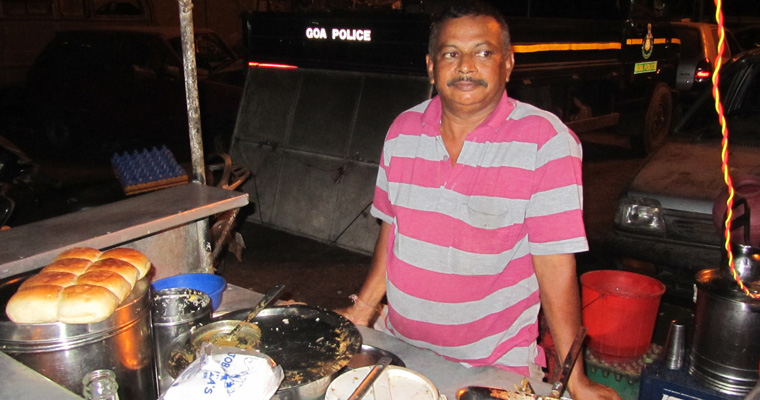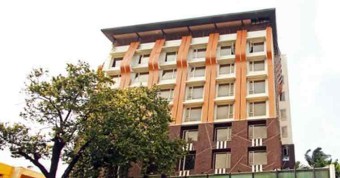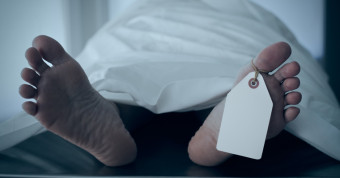Late in the evening, the aroma of omelettes and chicken drifts around the old Margao bus stand. Half a dozen carts come alive there, serving tired commuters an appetizing bite till late in the night. There are vegetarian carts that offer pakoras and batatawadas, but most of them are ras-omelettes (omelette and chicken gravy) carts.
Govind Khandeparkar is busy breaking eggs into his pan, as he has been doing thousands of times in his life. The plate of chopped onion, a few strands of coriander and a stack of hot bread wait besides his pan.
“Break two eggs and let them lie there for a while,” instructs a customer. Govind patiently carries out these rare custom egg frying orders. His standard dish is the omelette and chicken gravy, which he can make in his sleep. “Now turn it for just two seconds,” says the egg-aficionado. “Yes, that’s it, enough!” And the barely fried eggs are plated up, the yolk shyly seeping out to meet the gravy.
This is not just a story about a man who makes omelettes. It’s also a tale of triumph – of bettering one’s lot and creating a better world for those you love. This is the story of the man behind the food cart – a story like so many others in Goa and around the world, and yet extraordinary once you scratch beneath the surface.
“I started out collecting sopo (stall tax) for the Margao Municipality in 1980,” Govind reminisces. “In 1995 I also began providing packed meals for the RTO office, at that time it was housed in the Communidade building. I was delivering 40 meals a day to the RTO. Then one of the fellows at the Municipality said – now you are married, how will you manage like this, why don’t you put up a food cart? So I got the cart built and started serving ras-omelette and chicken here.”
The carts all line up at night at the old bus stand of Margao, in front of the Police Station. Just behind the carts lies the wreckage of cars and motorcycles that have met with accidents. The battered vehicles tell their own stories.
“I have worked very hard for my daughters’ education. I didn’t study much, but I wanted them to be well educated. I studied up to the fifth standard. Then when I was working as a sopo collector in the day, I went to Loyola High School’s night school and studied sixth to eighth standard there. Hanvem zaite circus kelea…I have worked on so many jobs.”
His eldest daughter obtained her Commerce degree and is now employed at a bank in Margao. The second too has gained her Commerce degree and will soon be working. The third is in the third year of an Arts degree course.
“I used to drink quite frequently. Then one day my eldest daughter said to me ‘Just imagine, if we study well, and you come to our college, and the teacher talks to you and tells you your daughters are studying well, and you talk to them, they will smell the alcohol on your breath and think – his daughters are studying well, but the father is drinking. Would you like that? After all what are you doing all this hard work for us for?’ What she said struck me very hard and I sat thinking about it. Then I took the bottle from my side – I would not drink at a bar, I would drink only at home, all by myself – and swung it and threw it as far as I could. From that day to today, I have not touched alcohol.”
In the past an old Petromax would light up the cart, giving off its trademark hissing sound and kerosene fumes. It has now given way to a fluorescent lamp hanging from the roof of the cart, connected to a rusty looking contraption.
“That’s an invertor,” Govind tells me. “Now it is difficult to get kerosene, we get it from here and there. We can’t afford to use kerosene for the Petromax. So we use these bulbs, connected to an inverter.” It is nearly midnight now, and the lamp goes off every few minutes, the invertor’s charge almost depleted.
Govind too looks tired. In another half hour, by midnight, he will close his cart, wheel it to a safe place, lock it up, and return home. Home to his family, to his wife, and to his daughters who are probably already asleep, safe in the world that their father has built for them.
This is our latest piece looking at the real-life trials and triumphs of the people of Goa.
.
.
.




